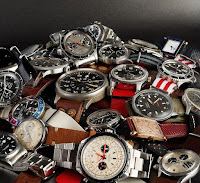 |
| Discarded watches |
I have not worn a watch for over 12 years. Ironically
(given the theme of this blog) I can name to the minute the event that prompted
me to take that decision.
In February 2011 I was living in Christchurch, the
largest city in the South Island of New Zealand. It had been my home for the
previous 30 years. On the 22nd of that month, at 12.51 pm (NZT) a magnitude
6.3 earthquake hit Christchurch. Many buildings were destroyed, and homes wrecked.
185 people were killed – three of them friends of mine.
Following that event, knowing the precise time seemed
irrelevant. All that mattered in the minutes and hours after the earthquake was
to ensure that children, the elderly, and those with disabilities were safe, comforted
and/or supported. All that mattered was that people cared. All that mattered
was NOW.
There was no need to know the time in order to be
someplace. Someplace was HERE. There was no need to make appointments.
Appointments were HERE and NOW.
Somewhere in the midst of the chaos, debris,
destruction, and the empathy, caring and thoughtfulness of people, I took off
my watch and did not go looking for it again. At the time this was not a
conscious decision.
Now it is! Now, I have decided that wearing a watch is
a waste of time.
Watch Wearing
Why do we wear watches? When I was young, one of the
signifiers of “growing up” was to acquire a watch. It was sign of maturity, or
at least a recognition that I was to become responsible. (I now recognise this
to be a flawed idea.)
Perhaps the unstated mythology around watch wearing is
that we do so in order to know how many minutes or hours we have to be able to
get to somewhere else. Wearing a watch may direct our attention towards the
future.
Simply put, wearing a watch indicates that we are no
longer present. Even though we may know the precise time, we are not present with
that time. In his bestselling book The Power of Now, Eckart Tolle tells
us that, “The more you are focused on time - past and present – the more you
miss the Now, the most precious thing there is.”1
A common complaint I hear is that someone does not
have enough time. Yet, it is our steadfast focus on being accurate in knowing
the time that contributes to this grievance. In having ready access to the
exact time on one’s wrist (or on the ubiquitous phone) we become limited by
time.
Famously, Steve Jobs (co-founder of Apple Inc.) did
not wear a watch. When asked one day by his daughter the reason for not doing
so, Jobs replied, “I don’t want to be bound by time.”
Yet, sadly, we seem to mistakenly believe that wearing
a watch, and having instant knowledge of the time, makes us more productive,
and better prepared.
Being “bound by time” can lead to frustration, anxiety,
and depression. For many in today’s world, these ills are chronic. Many people
never get the chance to relax. There is an increasing pressure to be constantly
and continuously available, and kept slave to timetables and time constraints.
Surely, such a state cannot be healthy. Yet,
punctuality and conscientiousness are extolled in today’s world of increased
productivity and the relentless desire for achievement and progress.
There does seem to be some evidence suggesting that
wearing a watch makes the wearer more conscientious. A 2015 research paper by
psychologists in the U.K. indicates that those who wear a watch may be up to 15%
more conscientious that those who do not. Indeed, showing this was the
objective of the research.2
Interestingly, however, buried amongst the statistics
in this paper is another correspondence between wearing and not wearing a watch
and openness to experience.
Those who did not wear a watch were more likely (by
around 11%) to be open to experience than those who wore a watch.
These results beg the question: Do we prefer to be
conscientious and on time, or do we prefer to experience the world and our role
in it?
I would argue for the latter. It can be argued that
one of the (many) reasons for the various ills of the world is that we are
disconnected from experiencing fully that world.
By binding ourselves to time we would seem to be
wasting our time.
Notes:
1. Tolle, Eckhart, The Power of Now, New World
Library, Novato, California, 2004
2. David Ellis (Lancaster University) & Rob Jenkins
(University of York), Watch wearing as a marker of conscientiousness, PeerJ
3:e1210; DOI 10.7717/peerj.1210, August 2015
No comments:
Post a Comment
This blogsite is dedicated to positive dialoque and a respectful learning environment. Therefore, I retain the right to remove comments that are: profane, personal attacks, hateful, spam, offensive, irrelevant (off-topic) or detract in other ways from these principles.